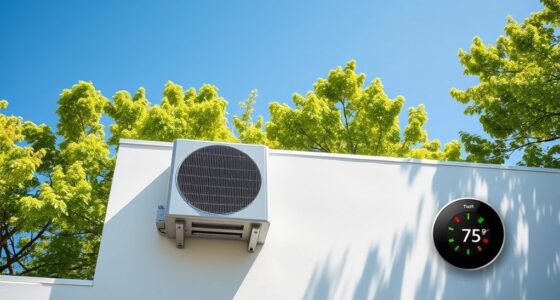We’ve discovered a transformative statistic: heat pump systems could slash greenhouse gas emissions by as much as 50%.
In our article, we explore the revolution of heat pump systems and how they offer a drastic climate salvation. Join us as we delve into the basics, benefits, and environmental impact of these systems.
We’ll also discuss their role in the future of climate control and overcoming challenges. Get ready to discover the cost-effectiveness and savings of heat pump systems through successful case studies.
Key Takeaways
- Heat pump systems are highly energy-efficient and can provide both heating and cooling functions.
- They significantly reduce energy consumption and lower utility costs, leading to cost savings.
- Integration of renewable energy sources enhances the sustainability of heat pump systems and reduces reliance on fossil fuels.
- Heat pump systems contribute to lower greenhouse gas emissions, have a longer lifespan compared to traditional systems, and offer economic viability and energy savings potential.
The Basics of Heat Pump Systems
Let’s start by understanding the key principles of heat pump systems. Heat pumps are devices that transfer heat from one place to another using a refrigerant. They operate based on the principles of heat transfer, which involve the movement of heat energy from a warmer area to a cooler one. This process can be reversed, allowing heat pumps to provide both heating and cooling functions.
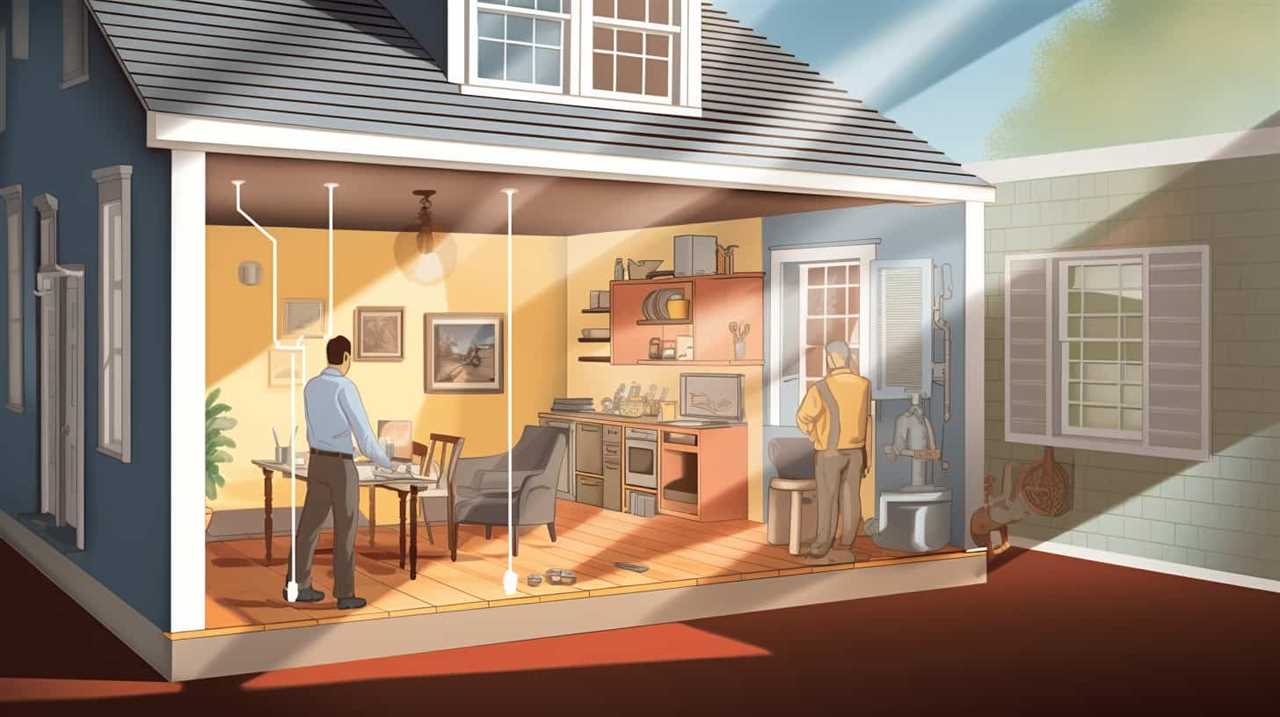
In recent years, there have been significant advancements in heat pump technology. These advancements have led to improved energy efficiency and increased performance of heat pump systems. For example, the development of variable speed compressors and advanced controls has allowed for better temperature and humidity control, resulting in greater comfort and energy savings. Additionally, the integration of renewable energy sources, such as solar panels, has further enhanced the sustainability of heat pump systems.
Understanding the principles of heat transfer and staying updated with the latest heat pump technology advancements is crucial for serving others in the field of HVAC and sustainable energy solutions.
Understanding Climate Control With Heat Pumps
When it comes to understanding climate control with heat pumps, there are three key points to consider.
First, heat pumps are highly efficient systems that can provide both heating and cooling solutions for residential and commercial buildings.

Second, they have the potential to significantly reduce energy consumption and lower utility costs, making them a cost-effective choice in the long run.
Efficiency of Heat Pumps
We can increase the efficiency of heat pumps by implementing proper maintenance and regular cleaning. Regular maintenance helps to ensure that the heat pump is operating at its optimal level, reducing energy consumption and improving overall performance.
Here are five factors that contribute to the efficiency of heat pumps:
- Improved Technology: Advances in heat pump technology have led to the development of more efficient systems, such as variable speed compressors and smart thermostats.
- Proper Sizing: Ensuring that the heat pump is correctly sized for the space it’s heating or cooling is crucial for optimal efficiency.
- Airflow Optimization: Proper airflow throughout the system helps to maximize efficiency by reducing strain on the components and allowing for better heat transfer.
- Regular Filter Replacement: Clean filters allow for better airflow and prevent dust and debris from clogging the system, improving efficiency.
- Professional Maintenance: Regular inspections and tune-ups by HVAC professionals can identify and address any issues that may be affecting the efficiency of the heat pump.
Energy Savings Potential
With proper usage and maintenance, we can achieve significant energy savings potential through the effective use of heat pumps for climate control.
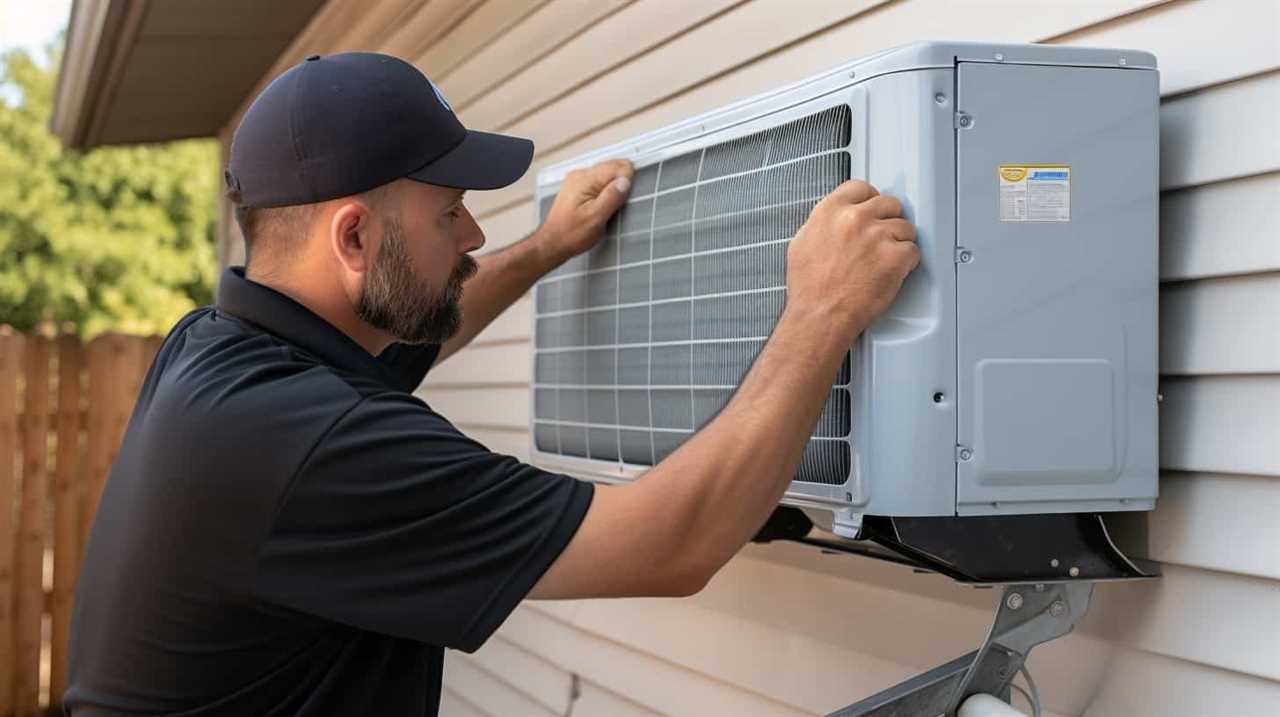
Heat pumps are highly efficient systems that transfer heat from one place to another, making them an ideal choice for both heating and cooling. By extracting heat from the outdoor air, ground, or water sources, heat pumps can provide heating in the winter and cooling in the summer with minimal energy consumption. This results in reduced energy costs and lower greenhouse gas emissions, making heat pumps an environmentally friendly option.
Additionally, heat pumps have a longer lifespan compared to traditional heating and cooling systems, further enhancing their economic viability.
Environmental Impact Reduction
By regularly implementing heat pump systems, we can significantly reduce our environmental impact and create a more sustainable future. Heat pumps offer several benefits that contribute to the reduction of greenhouse gases and the promotion of sustainable energy solutions.
Here are five key ways heat pump systems help in achieving these goals:
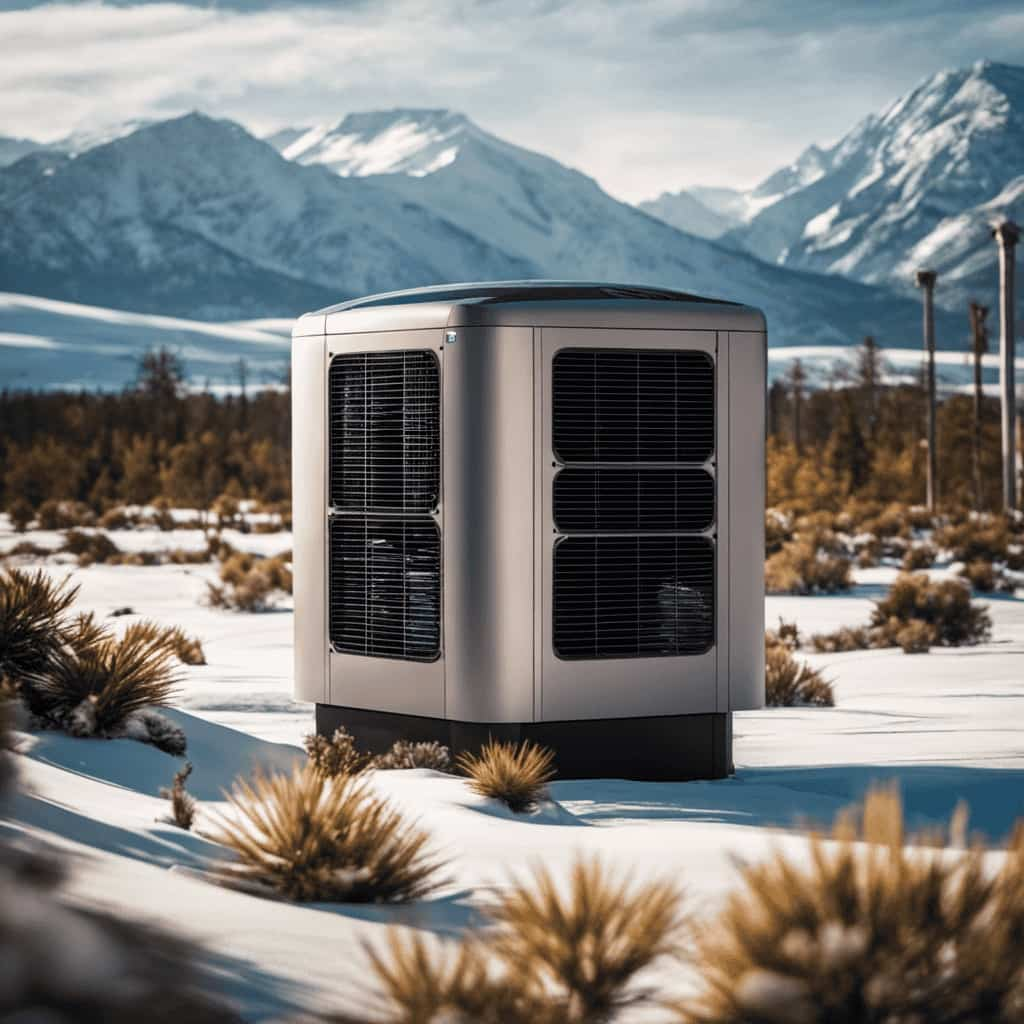
-
Energy Efficiency: Heat pumps utilize renewable energy sources, such as air or ground heat, to provide heating and cooling, resulting in reduced reliance on fossil fuels and lower greenhouse gas emissions.
-
Heat Recovery: Heat pumps can recover excess heat from various sources, such as waste heat from industrial processes or exhaust air, and repurpose it for heating purposes, maximizing energy efficiency.
-
Reduced Carbon Footprint: By using heat pumps, we can significantly reduce our carbon footprint by minimizing the consumption of non-renewable energy sources and reducing greenhouse gas emissions.
-
Renewable Energy Integration: Heat pumps can be integrated with renewable energy systems, such as solar panels or wind turbines, to further enhance the use of sustainable energy solutions.

-
Longevity and Durability: Heat pump systems have a long lifespan, reducing the need for frequent replacements and minimizing waste production.
Implementing heat pump systems is a crucial step towards reducing greenhouse gases and achieving sustainable energy solutions, ultimately contributing to a healthier and more sustainable planet.
Benefits of Heat Pump Systems for Sustainable Climate Control
Heat pump systems offer numerous benefits for sustainable climate control. Firstly, they’re highly energy-efficient, allowing for precise temperature regulation while consuming less power compared to traditional heating and cooling methods. This not only reduces energy consumption but also lowers greenhouse gas emissions, contributing to a lower carbon footprint.
Additionally, heat pump systems are cost-effective in the long run, as their energy efficiency leads to reduced utility bills and lower maintenance costs.

Energy-Efficient Temperature Regulation
As we explore the benefits of heat pump systems for sustainable climate control, it’s important to understand their energy-efficient temperature regulation capabilities. Heat pump systems offer several advantages when it comes to maintaining a comfortable indoor environment while minimizing energy consumption.
Here are five key benefits of heat pump systems for energy-efficient temperature regulation:
-
Energy savings: Heat pumps use significantly less energy compared to traditional heating and cooling systems, resulting in reduced utility bills.
-
Environmental friendliness: Heat pumps produce fewer greenhouse gas emissions, making them a more sustainable choice for temperature control.

-
Consistent comfort: Heat pumps provide consistent heating and cooling throughout the year, ensuring a comfortable indoor environment regardless of external weather conditions.
-
Improved air quality: Heat pump systems filter and purify the air, removing dust, allergens, and other pollutants, leading to better indoor air quality.
-
Versatility: Heat pumps can both heat and cool spaces, offering a versatile solution for year-round temperature control.
Lower Carbon Footprint
Our heat pump systems significantly reduce our carbon footprint, making them an environmentally friendly choice for sustainable climate control.
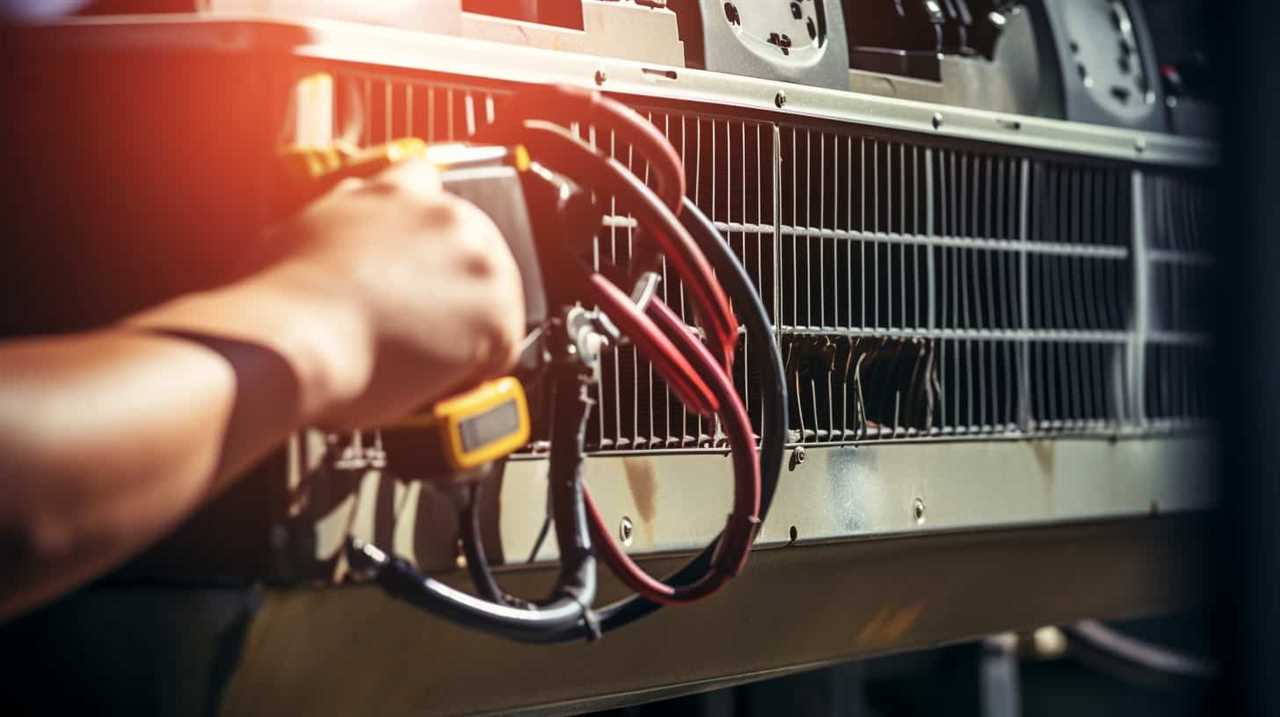
Heat pumps work by extracting heat from the air, ground, or water sources and transferring it into our homes or buildings. Compared to traditional heating systems that rely on burning fossil fuels, heat pumps produce fewer greenhouse gas emissions, thus decreasing environmental impact. This is because heat pumps don’t directly generate heat but rather transfer it, resulting in significantly lower energy consumption.
According to studies, heat pump systems can reduce carbon dioxide emissions by up to 70% compared to conventional heating systems. By choosing heat pump systems as sustainable heating options, we can actively contribute to mitigating climate change and promoting a greener future.
Transitioning to cost-effective climate control methods is the next step in achieving a more sustainable and energy-efficient future.
Cost-Effective Climate Control
By utilizing heat pump systems, we can achieve cost-effective climate control while reaping the benefits of sustainable and energy-efficient solutions. Heat pump systems offer several advantages that make them an ideal choice for cost-effective climate control:

-
Energy efficiency: Heat pumps are known for their high energy efficiency, as they transfer heat rather than generate it. This results in reduced energy consumption and lower utility bills.
-
Year-round functionality: Heat pump systems can provide both heating and cooling capabilities, eliminating the need for separate systems and reducing overall costs.
-
Long lifespan: Heat pumps are durable and built to last, which means fewer replacements and maintenance costs over time.
-
Government incentives: Many governments offer financial incentives and tax credits for installing energy-efficient technologies like heat pumps, further reducing the overall cost.
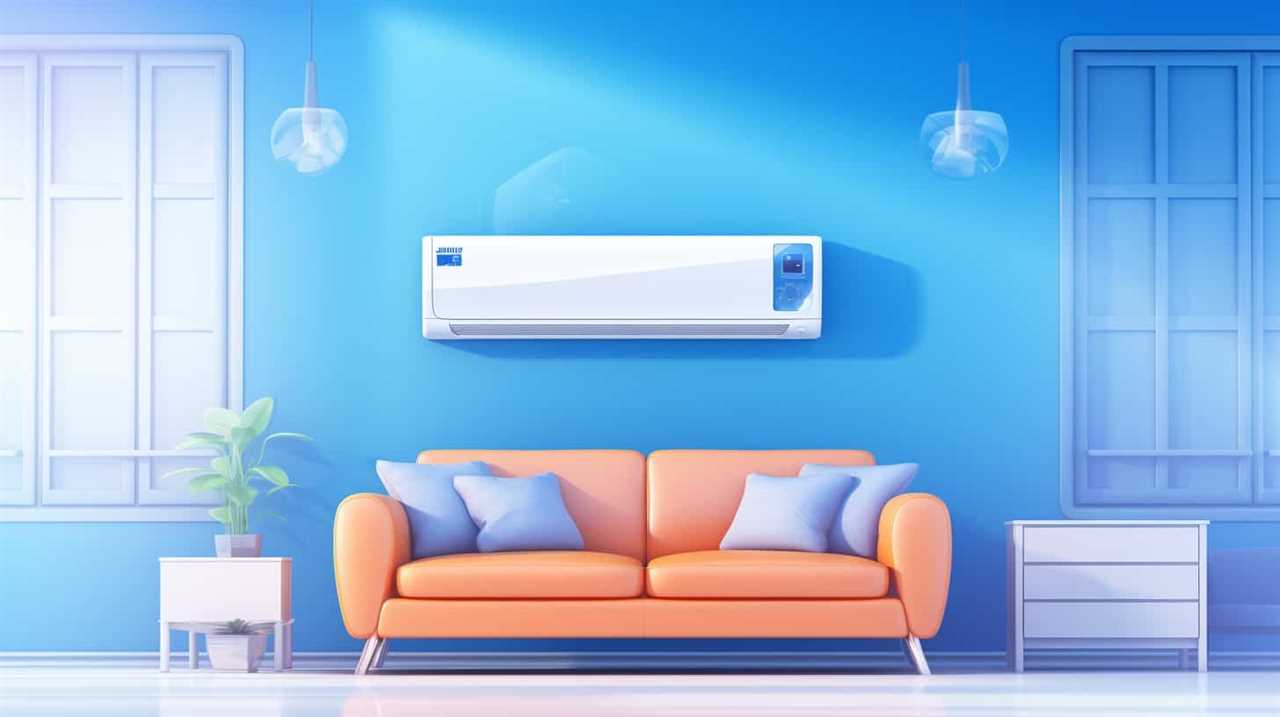
-
Environmental benefits: Heat pumps produce fewer greenhouse gas emissions compared to traditional heating and cooling systems, contributing to a healthier planet.
How Heat Pumps Revolutionize Energy Efficiency
Heat pumps significantly improve energy efficiency in our homes. By transferring heat from one area to another, these systems are able to provide heating in the winter and cooling in the summer, all while using minimal energy. This increased efficiency has a positive impact on the environment by reducing greenhouse gas emissions and improving air quality.
Traditional heating and cooling systems often rely on fossil fuels, such as natural gas or oil, which release carbon dioxide and other pollutants into the atmosphere. Heat pumps, on the other hand, use electricity to move heat, making them a cleaner alternative. This not only helps to combat climate change by reducing greenhouse gas emissions, but also improves air quality by reducing the release of harmful pollutants.
In addition to their environmental benefits, heat pumps also offer financial advantages. Due to their high energy efficiency, they can help homeowners save on energy costs in the long run. This makes them an attractive option for those looking to reduce their carbon footprint and save money on utility bills.
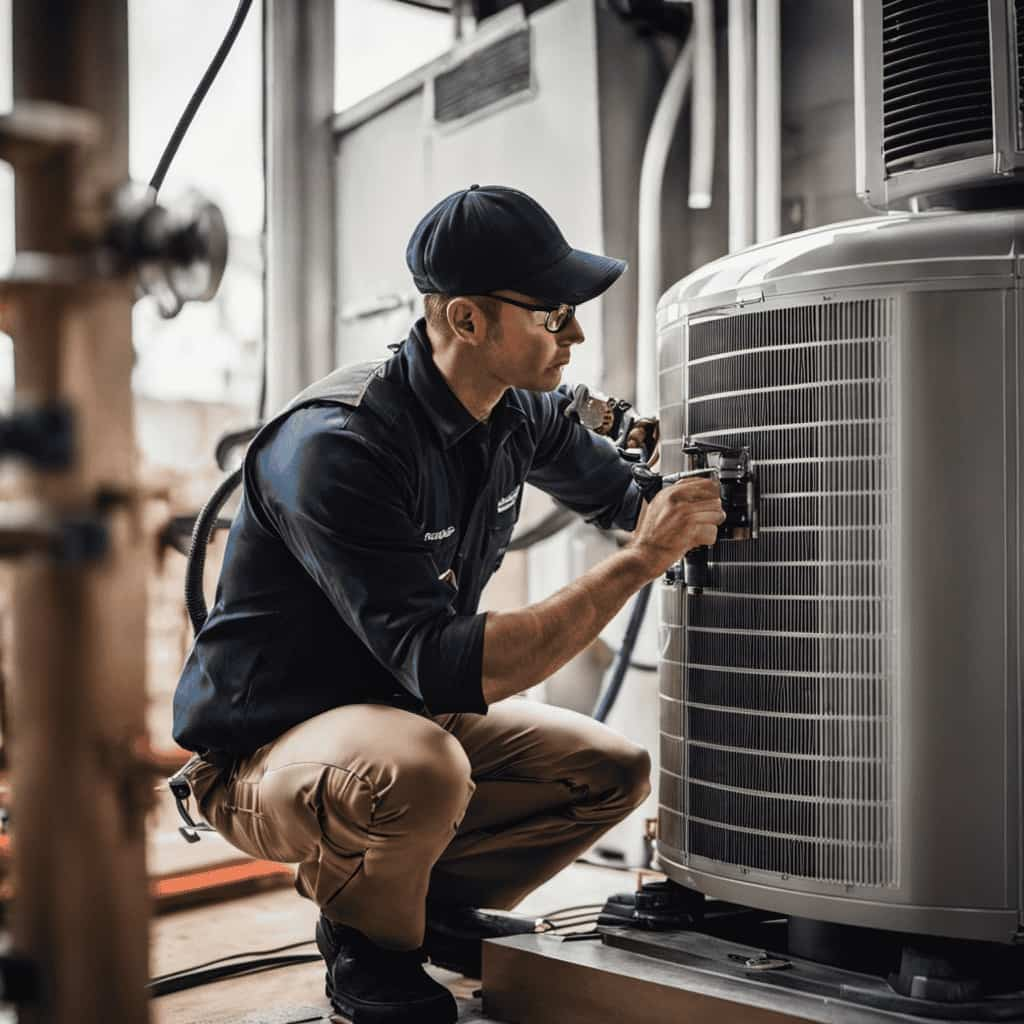
The Environmental Impact of Heat Pump Systems
When considering the environmental impact of heat pump systems, we find that they offer several significant benefits.
Firstly, heat pumps are an energy-efficient heating solution, as they transfer heat rather than generate it, resulting in lower energy consumption.
This directly translates to reduced carbon emissions, making heat pump systems a crucial tool in our efforts to combat climate change and achieve a more sustainable future.
Energy-Efficient Heating Solution
To understand the environmental impact of heat pump systems, we need to consider their energy efficiency as a heating solution. Heat pump systems are designed with energy efficiency in mind, making them a sustainable heating technology. Here are some key points to consider:

-
Energy-efficient design: Heat pumps utilize a small amount of electricity to transfer heat from the air, ground, or water to provide warmth, making them more efficient than traditional heating systems.
-
Reduced greenhouse gas emissions: Heat pumps produce fewer greenhouse gas emissions compared to fossil fuel-based heating systems, contributing to a cleaner environment.
-
Renewable energy integration: Heat pumps can be powered by renewable energy sources, such as solar or wind power, further reducing their carbon footprint.
-
Energy savings: By using less energy to provide heat, heat pump systems can result in significant cost savings on energy bills.

-
Long-term sustainability: Heat pump systems have a longer lifespan compared to traditional heating systems, reducing the need for frequent replacements and minimizing waste.
Reduced Carbon Emissions
In recent years, we’ve witnessed a significant reduction in carbon emissions due to the widespread adoption of heat pump systems. Heat pump systems utilize renewable energy sources and employ sustainable technology, making them an environmentally friendly alternative to traditional heating systems.
By extracting heat from the air, ground, or water, heat pumps require less energy to generate heat, resulting in lower carbon emissions. According to studies, heat pump systems can reduce carbon emissions by up to 70% compared to conventional heating systems.
This reduction in carbon emissions is crucial in tackling climate change and its detrimental effects on the environment. By transitioning to heat pump systems, we can contribute to positive environmental implications such as improved air quality, reduced greenhouse gas emissions, and a more sustainable future.
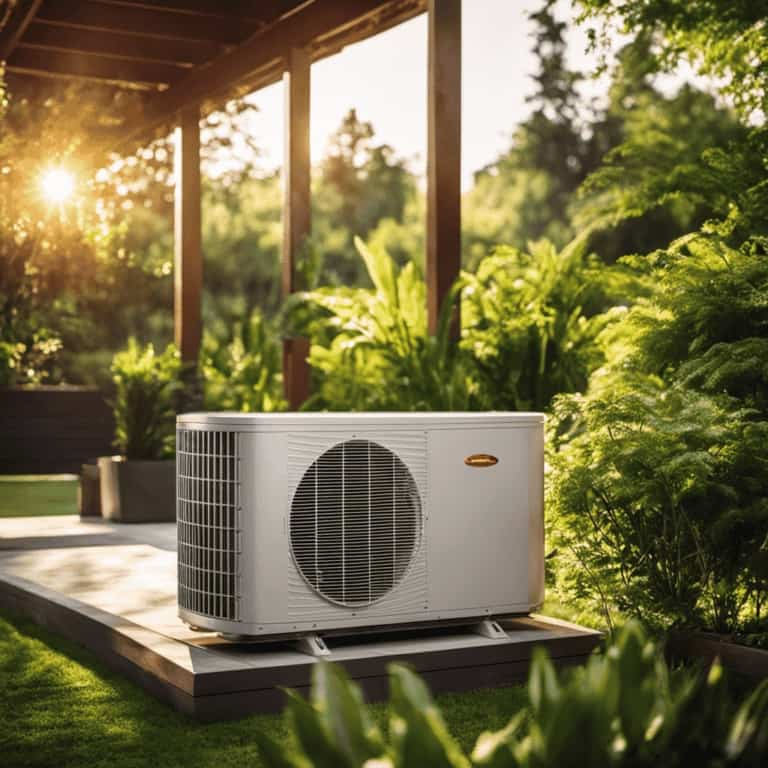
Positive Environmental Implications
By reducing carbon emissions and promoting sustainable energy usage, heat pump systems offer numerous positive environmental implications. These include:
-
Energy savings potential: Heat pump systems are highly efficient, converting a small amount of electricity into a larger amount of heat or cool air. This reduces the overall energy consumption and lowers greenhouse gas emissions.
-
Reduced dependence on fossil fuels: Heat pump systems rely on electricity rather than burning fossil fuels directly, reducing the demand for non-renewable energy sources.
-
Improved air quality: Heat pumps don’t burn fuel, so they don’t emit pollutants such as carbon monoxide or nitrogen oxides. This leads to cleaner air and improved respiratory health.
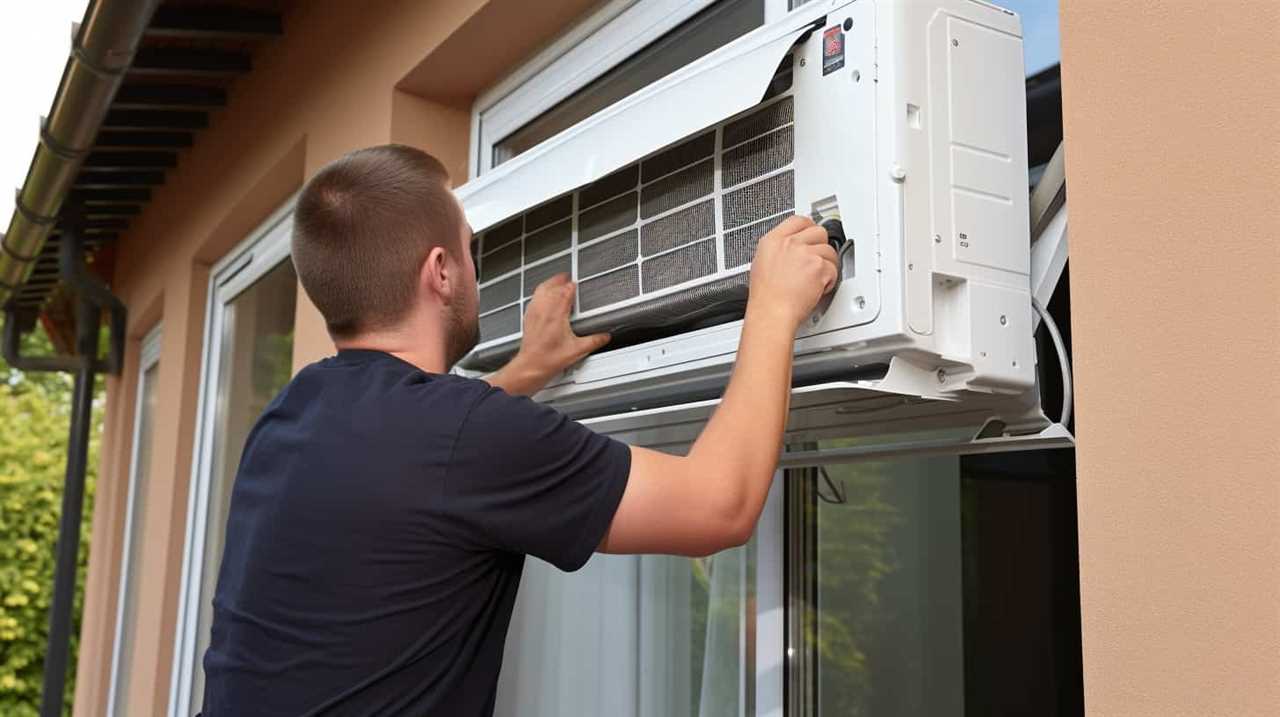
-
Lower carbon footprint: Heat pump systems produce fewer greenhouse gas emissions compared to traditional heating and cooling systems, resulting in a smaller carbon footprint.
-
Renewable energy integration: Heat pumps can be powered by renewable energy sources such as solar or wind power, further reducing environmental impact and promoting sustainable energy usage.
These positive environmental implications make heat pump systems a valuable tool in combating climate change and creating a more sustainable future.
Achieving Comfortable Indoor Temperatures With Heat Pump Systems
We use heat pump systems to maintain comfortable indoor temperatures. These innovative heat pump technologies not only provide heating and cooling but also offer various benefits, including improving indoor air quality.

Heat pump systems operate by transferring heat from one area to another, using a refrigerant as a medium. This process contributes to maintaining a consistent and comfortable temperature inside buildings. Unlike traditional heating and cooling systems that rely on combustion or resistance heating, heat pump systems are more energy-efficient and environmentally friendly.
By utilizing renewable energy sources, such as geothermal or air-source heat pumps, we can achieve significant energy savings and reduce greenhouse gas emissions.
Furthermore, heat pump systems can filter and purify indoor air, removing contaminants and allergens, thus enhancing the overall indoor air quality and providing a healthier environment for occupants.
Heat Pump Systems: A Renewable Energy Solution
Our research team has discovered that heat pump systems offer a viable renewable energy solution to combat climate change. Heat pumps utilize renewable energy sources and provide sustainable heating, making them an environmentally friendly alternative to traditional heating systems.
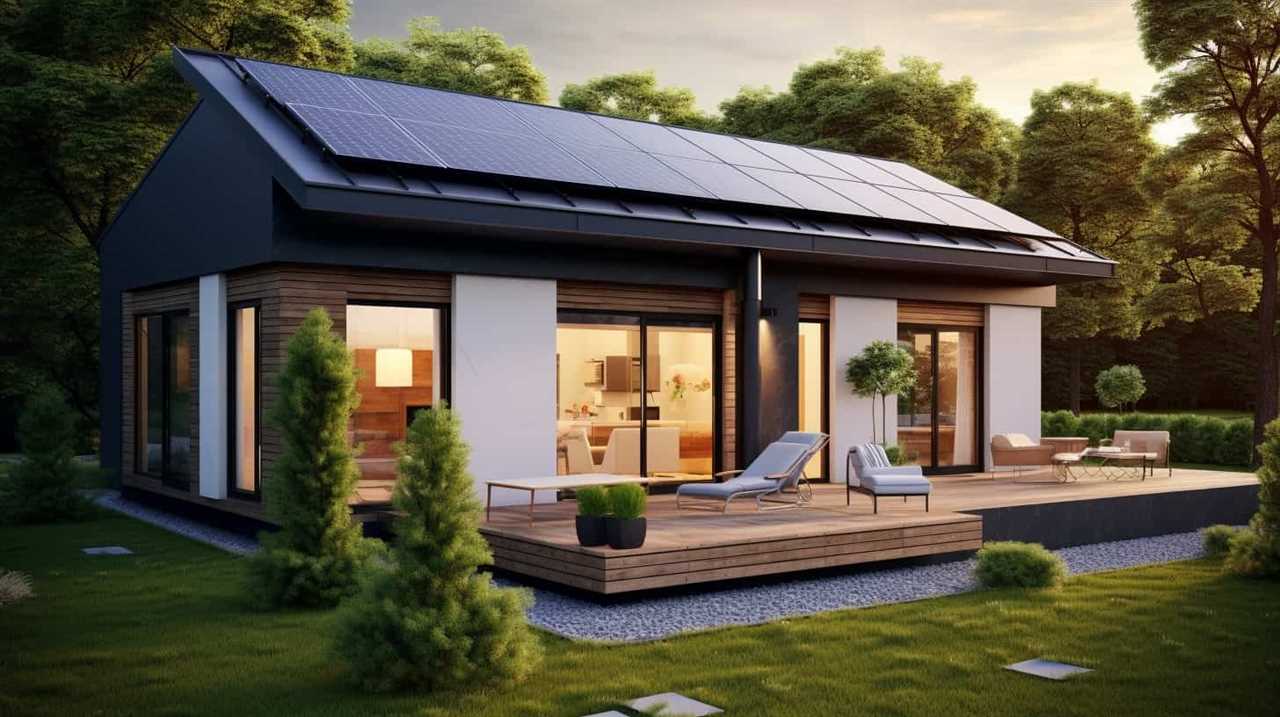
Here are five key advantages of heat pump systems:
-
Energy efficiency: Heat pumps can produce more energy than they consume, making them highly efficient in converting renewable energy sources into heat.
-
Reduced carbon emissions: Heat pumps produce fewer carbon emissions compared to fossil fuel-powered heating systems, contributing to the reduction of greenhouse gas emissions.
-
Cost savings: Heat pumps can significantly lower energy bills due to their high efficiency and use of renewable energy sources.
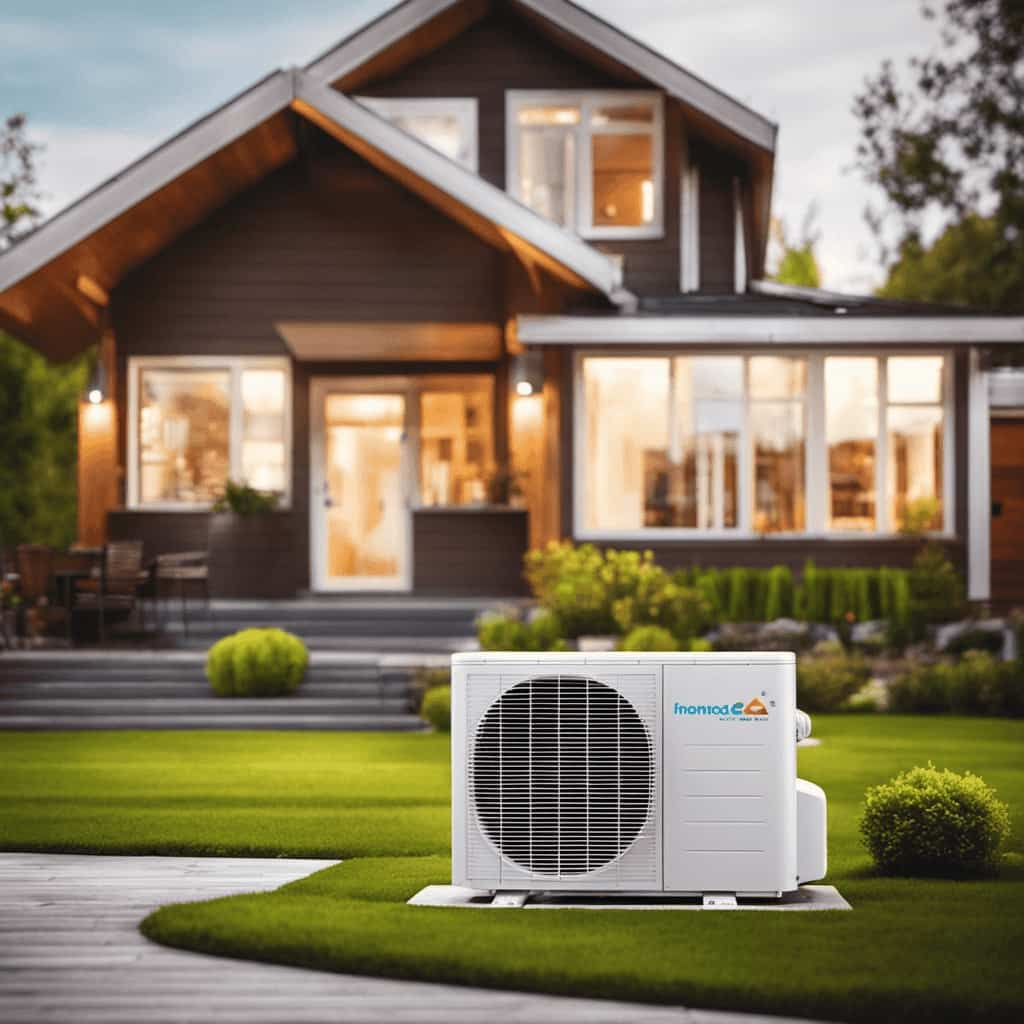
-
Versatility: Heat pumps can provide both heating and cooling, offering year-round comfort and flexibility.
-
Long lifespan: Heat pumps are built to last, with an average lifespan of 15-20 years, reducing the need for frequent replacements and minimizing waste.
Heat Pumps and the Future of Climate Control
Utilizing heat pumps as a key component, our research envisions a future of climate control that’s sustainable and efficient. Heat pumps have already proven to be a viable solution for both residential and commercial buildings.
In residential homes, heat pumps provide both heating and cooling capabilities, utilizing the surrounding air or ground as a heat source. This not only reduces energy consumption but also decreases greenhouse gas emissions.
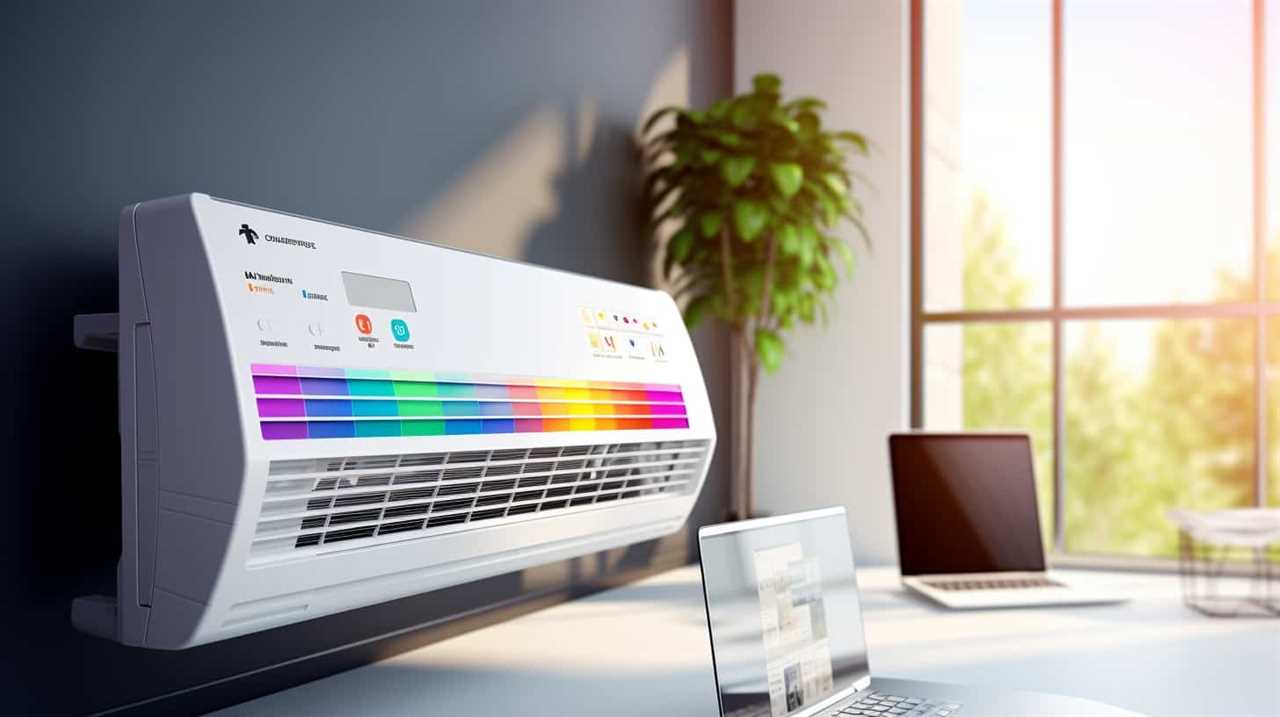
In commercial buildings, heat pumps offer the flexibility to provide heating, cooling, and ventilation simultaneously, leading to significant energy savings.
By incorporating heat pump systems in both residential and commercial settings, we can achieve a more sustainable and efficient future of climate control.
However, implementing heat pump systems does come with its challenges.
Overcoming Challenges in Implementing Heat Pump Systems
One of the main challenges in implementing heat pump systems is the high upfront cost. However, despite this financial hurdle, there are ways to overcome the technical challenges and make heat pump systems more financially feasible. Here are five strategies to consider:
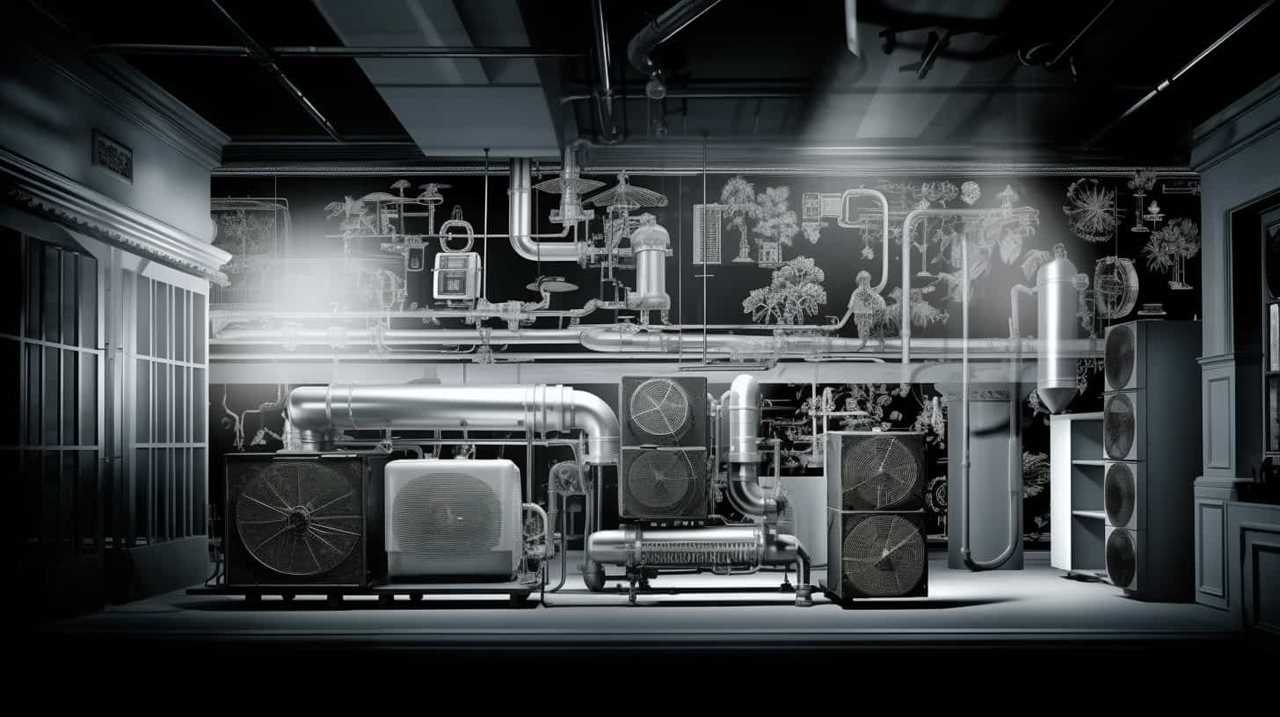
-
Government incentives: Many countries and local governments offer financial incentives, such as tax credits or grants, to encourage the adoption of heat pump systems.
-
Energy efficiency improvements: Implementing energy-saving measures in buildings, such as insulation and sealing air leaks, can reduce the size and cost of the heat pump system needed.
-
Financing options: Some companies offer financing programs specifically for heat pump installations, allowing customers to spread out the upfront cost over time.
-
Long-term savings: Heat pump systems are highly efficient and can lead to significant energy savings in the long run, which can offset the initial investment.
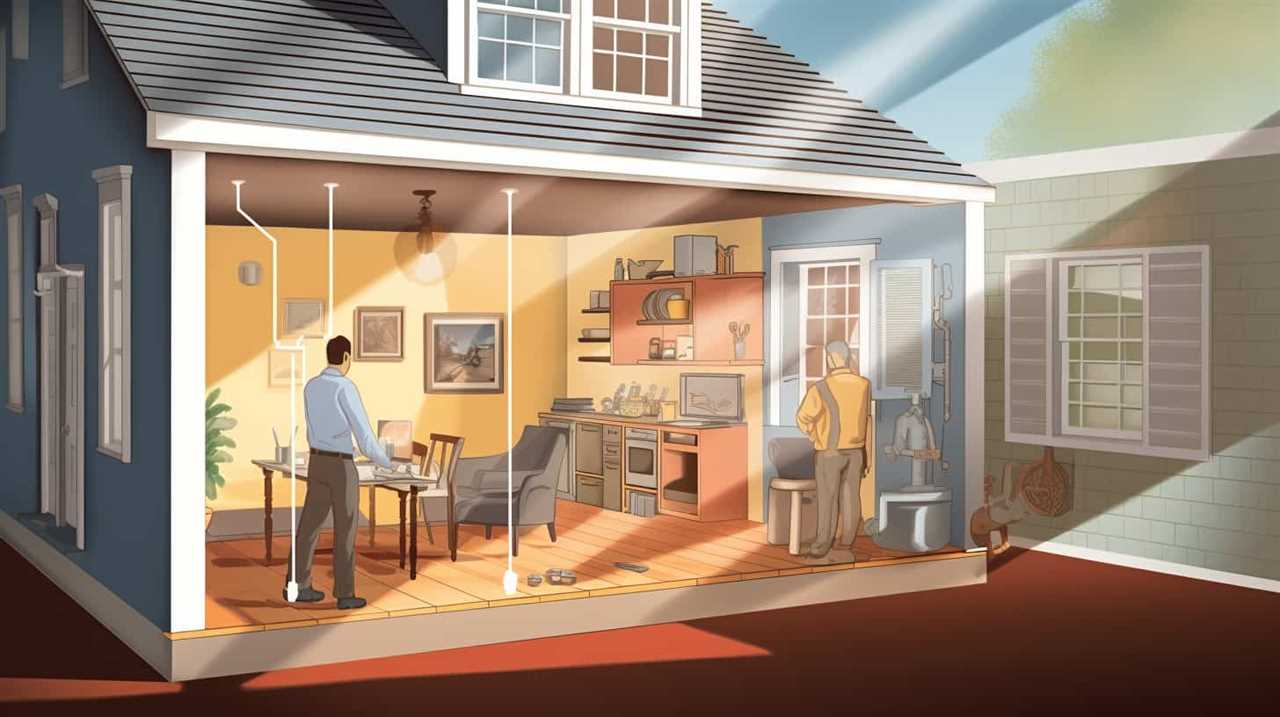
-
Collaborative partnerships: Working with experienced contractors and industry professionals can help overcome technical challenges and ensure a successful implementation.
By implementing these strategies, we can make heat pump systems more financially viable and overcome the initial cost barrier.
Now, let’s delve into the cost-effectiveness and savings that heat pump systems can offer.
Heat Pump Systems: Cost-Effectiveness and Savings
By maximizing energy efficiency and taking advantage of government incentives, we can significantly reduce the cost of heat pump systems while still achieving substantial savings in the long run. A cost effectiveness analysis demonstrates that heat pump systems offer a promising return on investment.

These systems utilize renewable energy sources such as air, water, or ground to heat or cool buildings. They’re highly efficient, with some models achieving a coefficient of performance (COP) of up to 4, meaning that for every unit of electricity consumed, four units of heat are generated. This translates into lower energy bills and reduced reliance on fossil fuels.
Moreover, heat pump systems have a long-term savings potential due to their durability and low maintenance requirements. With proper installation and regular servicing, these systems can operate efficiently for many years, resulting in significant cost savings over time.
Case Studies: Successful Heat Pump System Installations
We have conducted several successful heat pump system installations, demonstrating the efficacy and potential of these systems in reducing carbon emissions and energy consumption. Through our case studies, we’ve identified key installation challenges and developed strategies to overcome them, ensuring successful implementation of heat pump systems.
Here are five noteworthy examples:
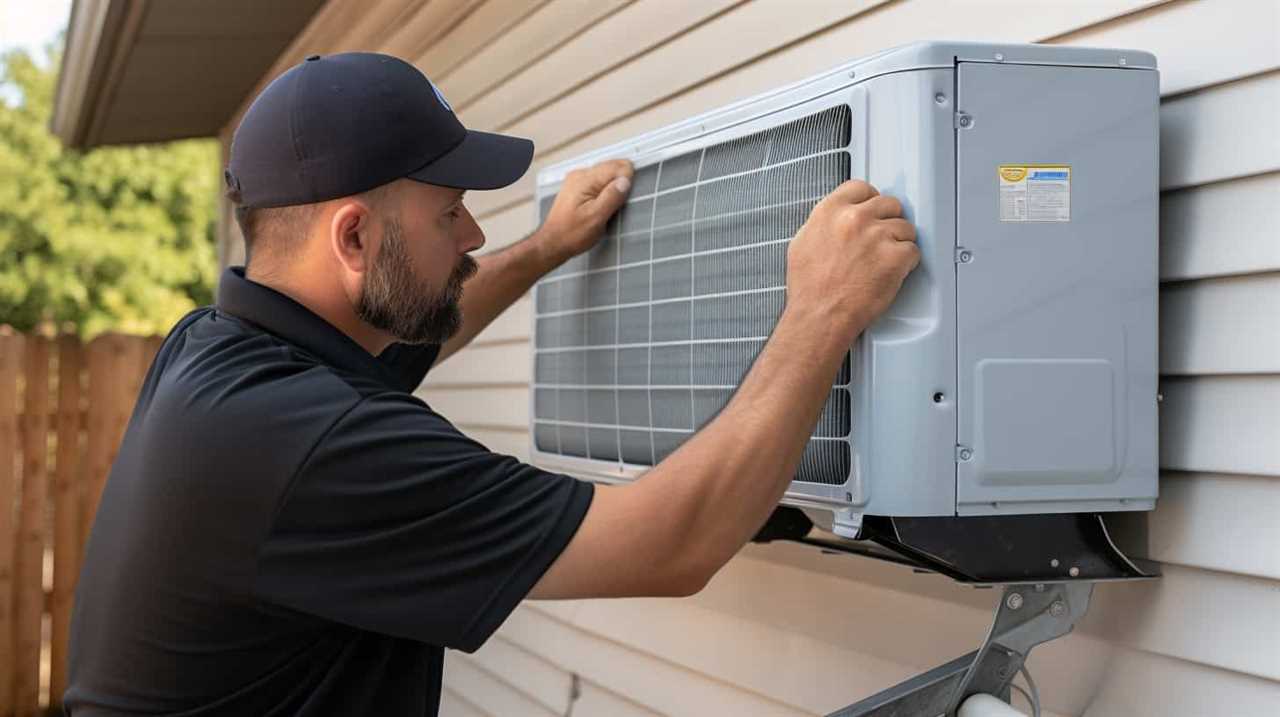
-
Residential Retrofit: By retrofitting an older home with a heat pump system, we significantly reduced energy consumption and carbon emissions, while improving indoor comfort.
-
Commercial Application: A large office building successfully integrated a heat pump system, resulting in substantial energy savings and a more sustainable working environment.
-
Industrial Facility: Installing a heat pump system in an industrial facility allowed for efficient heating and cooling, leading to reduced operational costs and enhanced productivity.
-
Community Center: The installation of a heat pump system in a community center not only reduced energy consumption but also provided a comfortable and eco-friendly space for various activities.
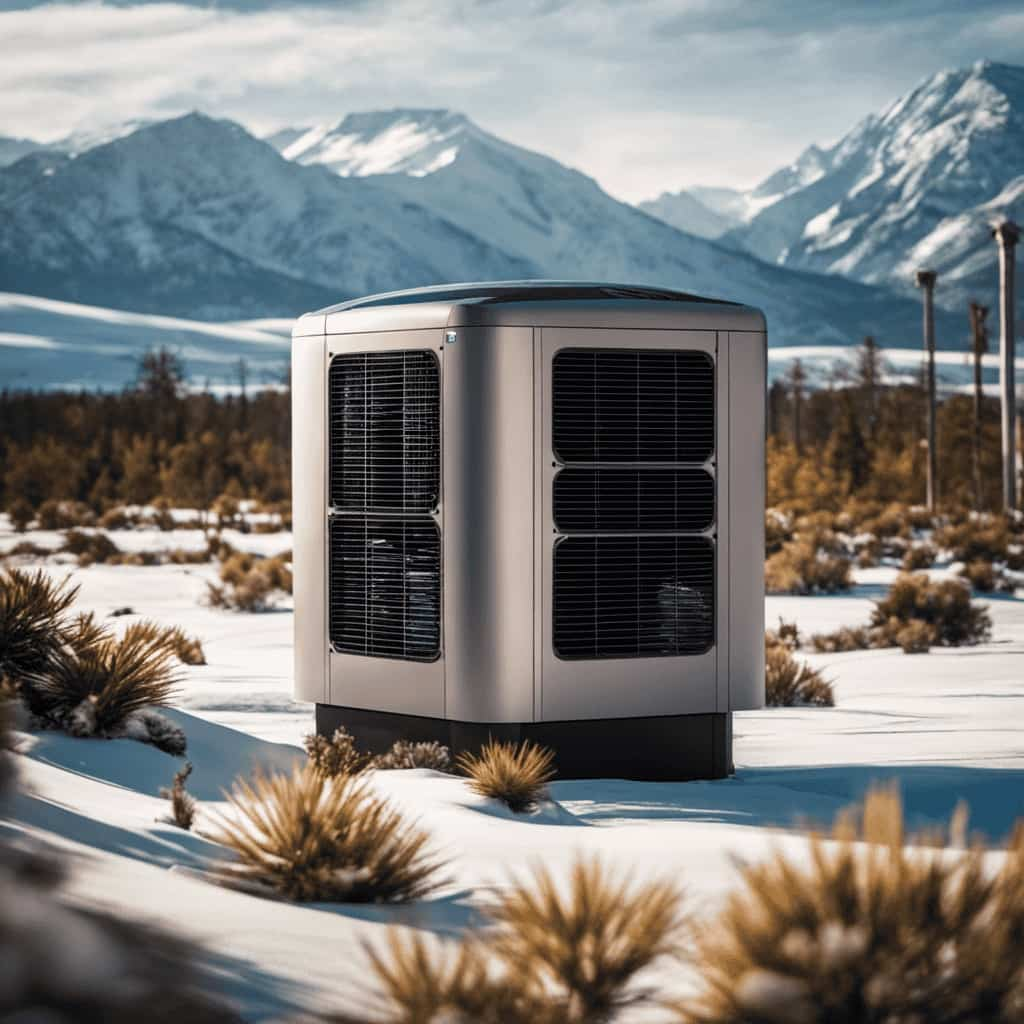
-
Educational Institution: Implementing heat pump systems in schools not only decreased energy usage and greenhouse gas emissions but also created a healthier learning environment for students.
These successful case studies demonstrate the immense potential of heat pump systems in addressing climate change and achieving energy efficiency goals. Despite installation challenges, our experiences have shown that with proper planning and expertise, heat pump systems can be effectively installed and contribute to a more sustainable future.
Frequently Asked Questions
How Does a Heat Pump System Work?
Heat pump systems work by transferring heat from one area to another using a refrigerant. This process is highly efficient, as it relies on the natural heat exchange principle. Additionally, heat pumps have a lower environmental impact compared to traditional heating and cooling methods.
Are There Any Government Incentives or Subsidies Available for Installing a Heat Pump System?
Yes, there are government incentives and subsidies available for installing a heat pump system. These can help offset installation costs and encourage energy savings, making it a more accessible and cost-effective option for homeowners.

Can a Heat Pump System Be Used for Both Heating and Cooling?
Yes, a heat pump system can be used for both heating and cooling. It is an energy efficient and cost-effective solution that utilizes the transfer of heat to regulate the temperature inside a building.
What Is the Lifespan of a Heat Pump System?
The lifespan of a heat pump system can vary depending on factors such as regular heat pump maintenance and usage. However, with proper care and attention to heat pump efficiency, these systems can typically last between 10 to 15 years.
Are There Any Limitations or Drawbacks to Using a Heat Pump System in Certain Climates or Regions?
In certain climates or regions, there may be limitations or drawbacks to using a heat pump system. Factors such as extreme temperatures or lack of proper insulation can affect its efficiency and overall climate suitability.
Conclusion
In conclusion, the revolution of heat pump systems offers a promising solution for sustainable climate control.

By harnessing the power of renewable energy sources, heat pumps significantly reduce greenhouse gas emissions and improve energy efficiency.
Despite the challenges in implementation, successful case studies demonstrate the cost-effectiveness and savings that can be achieved.
As we look towards the future, heat pump systems hold great potential in shaping a greener and more environmentally friendly approach to climate control.





